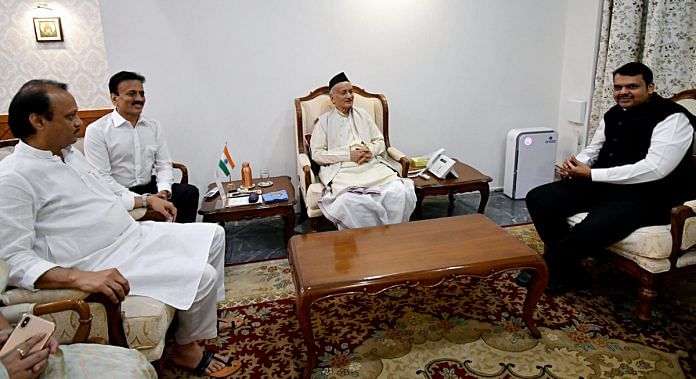New Delhi: In a dramatic turn of events, the BJP-NCP government in Maharashtra took charge after the President’s Rule, imposed in the state a fortnight ago, was revoked at 5.47 am Saturday.
Apart from the unprecedented turn of events in which BJP’s Devendra Fadnavis was sworn in as the chief minister and NCP’s Ajit Pawar his deputy, the procedure adopted to revoke the President’s Rule in the state has caught the attention of experts.
Maharashtra was put under President’s Rule on 12 November after the assembly elections last month delivered a fractured mandate. The President’s Rule is generally revoked after a recommendation for this is made by the Union cabinet to the President.
But the central government invoked Rule 12 of the Government of India (Transaction of Business) Rules to revoke the President’s Rule, without holding a meeting of the Union cabinet.
“Departure from Rules – The Prime Minister may, in any case or classes of cases, permit or condone a departure from these rules, to the extent he deems necessary,” states Rule 12.
This is also the Rule that was invoked by the then Prime Minister Indira Gandhi in 1975, as the head of the executive branch, to unilaterally assume emergency powers without consulting her cabinet.
The invocation of the provision, which is usually reserved for situations of “extreme urgency or unforeseen contingency in any particular case”, have left the experts divided over its propriety.
Also read: Shiv Sena, NCP, Congress move SC against Devendra Fadnavis, Ajit Pawar’s oath taking
‘Curable irregularity’
Talking to ThePrint, senior advocate Sanjay Hedge said the invocation of Rule 12 is a “curable irregularity” – one that can be undone by placing the President’s decision before the cabinet.
He explained: “The decision taken by the President will be put before the cabinet. The cabinet has to ratify the presidential decision…the 44th amendment made it mandatory for the President to act in aid and advice of the cabinet while proclaiming emergency. But Rule 12 can be invoked even if President is of the view there is an urgency and later ratify it before the cabinet.”
“I remember the famous cartoon after the emergency of President Fakhruddin Ali Ahmed signing the emergency declaration which made it clear how important is cabinet decision. In this case, even the prime minister can send a note to the President which can mean that President invokes Rule 12 to revoke the presidential rule,” he added.
While former secretary of the Lok Sabha and constitutional expert P.D.T Achary asserted that Saturday’s instance was an exception “that is not often invoked” he did not think there was anything illegal in the procedure adopted.
“These rules are made in consultation with the government and looks at specifically functioning of the cabinet. So it is perfectly legal for the President to invoke Rule 12 and the same has to be ratified by the cabinet,” he said.
Also read: BJP’s overnight coup didn’t happen overnight at all, and Sharad Pawar likely knew about it
‘Fraud on the Constitution’
Senior advocate KTS Tulsi, however, called the maneouver a “fraud on the Constitution”.
“The decision has to be taken in accordance with the business rules and the government has to take a decision, acting through the cabinet,” he told ThePrint.
“More important than this is what is emerging from the media coverage, that the letters of support signed by the MLAs in favour of NCP-Congress-Sena alliance have been misused by Ajit Pawar, claiming that these letters are in support of the BJP-NCP alliance. We don’t have the text of the letters, but if they did have the name of the NCP-Congress-Sena or the Sena-Congress alliance, then the whole process that has been adopted by the governor is unconstitutional.”
“I think the governor may have to go,” he added.




On a lighter note, from bath robe to night suit.